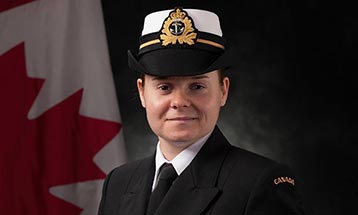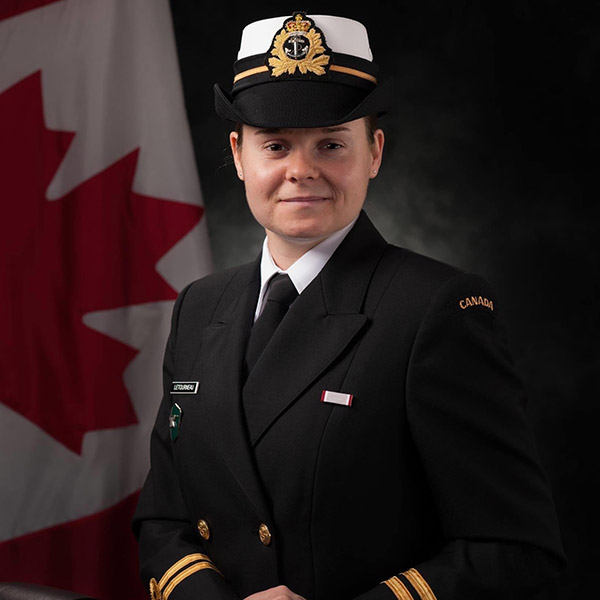Transcript
Emilie Létourneau:
My time in the Navy was great. I got to travel a lot, even from training, which was done in the United Kingdom. Afterwards deploying twice in the Arctic and then in the Caribbean Sea.
For me, being a woman in the Canadian Armed Forces was not a problem. I would say that the engineering team on the vessel was 95% male, even more at times. So sometimes it was a bit hard to take my rightful place, but I had to show them that I also had good ideas, that I had the knowledge and experience required. But I was lucky enough throughout my career to have people around me who helped and supported me. It wasn't too hard for me to really, like, take my place.
Life on the ship, you’re really focused, you’re getting ready for the next mission, you come back, you’re fixing the ship to get ready for the next mission. When I got posted here to Ottawa working in an office, that’s when you start realizing that you’re doing the same thing as someone who’s not wearing the uniform that’s right beside you. And that’s kind of how you also start to get a life where you’re home every night, you’re home every weekend and that kind of really got me thinking that maybe this is what I want to do now and I’ve given all that I had to the military.
The transition for me was relatively easy because I planned it. I was already doing a master’s degree in engineering and I was already starting to look at jobs. So when I actually made the decision to start applying, I already had a lot of things that were in my favor that made my transition go a bit smoother. So all that kind of made it a lot easy and the rest of it I basically had to deal with it on my own. But at least those big pieces of where you’re going to live, where you’re going to work and make money, those concerns for me were pre-planned so that made it really easy.
The official day of my leaving the Canadian Armed Forces, so in the morning I went to get my ID card, then signed the final papers that I had signed, then right away this feeling of freedom hit me. On the way home, I stopped at a store and bought a razor, and then the first thing I did when I got home was shave the side of my head. I wasn’t planning to, and there wasn’t really a huge significance; it was just, at that moment I thought to myself, now I can do what I want, when I want.
Vanessa Bruneau:
She’s probably one of the strongest people I know. The day I met her she’s someone that’s super outgoing and always got a smile on her face and you can that see she’s a real leader so that’s one of her best qualities I find.
The only Veteran I know is her. It was kind of all new to me at once. She’s definitely one of the most structured person I know. I used to not be really be a morning person. As soon as we met, you know, we’re up at 6:00 am and 6:15 am I’m out the door, going to the gym we have like a really good routine so…
Emilie Létourneau:
At first, I wasn't sure if I wanted to take things to the next level with her. She was certainly younger than I was, but I quickly got to know her and saw that, deep down, she was an old soul who knew where she was going, and she was very determined, and I wanted to share my journey with her.
Remembrance Day is filled with mixed feelings now. I do have a couple friends, military friends who have passed. So it’s definitely a day to remember them. It’s always... it’s always hard… because somewhere a little bit of myself feels like I let down some of the people who are still serving and that’s a bit hard.
Vanessa Bruneau:
Emilie asked me to take Remembrance Day off so it was the first day that I actually like participated in the activities. At first, when my co-workers were like “oh you’re taking the day off, like what are you doing” and I was like “oh, this is what I’m up to.” And they kind of like turned their heads a bit because it kind of shocked them ‘cause they didn’t expect her to be a Veteran just because of her age and just being a woman.
Emilie Létourneau:
I think that there are some misconceptions about what a Veteran is because I think that even some Veterans don’t even realize that they are a Veteran and that they have a right to call themselves as a Veteran. To me, a Veteran was someone who had fought the war in World War Two and that was now older and had a lot of medals. It’s the people that you would see on camera on Remembrance Day, starting the march. I realize afterwards that I gave a lot to the military and I was ready to give my life for Canada and I think that gave me the right to today call myself a Veteran.
Emilie Létourneau grew up in Rouyn-Noranda, Quebec—population 40,000. Her origins may have been humble, but her ambition and adventurous spirit were anything but. At age 17, Emilie enlisted in the Canadian Armed Forces (CAF). She served as a Marine Systems Engineering Officer in the Royal Canadian Navy for just under 11 years.
“My time in the Navy was great,” she says. “I got to travel a lot. First training in the United Kingdom, then deploying twice in the Arctic and once in the Caribbean Sea. I had a lot of fun visiting ports with friends. Overall, my experience was really good.”
Emilie studied engineering in school and says she enjoyed using what she learned on a warship. “We would get a call with intel that something was happening in a certain location. Then we would go full-speed ahead to try and meet a contact at the right location,” she explains. “It was stressful, and it was really exciting.”
Leading the charge as a woman
Emilie’s experience as a woman in the military was mostly positive. She credits that, in part, to her persistence. “I’m the kind of person who always pushes for what she wants, and I think that showed right away,” Emilie says.
I think people realized quickly that it was my place to be there too, and that I was there to help.
Still, she acknowledges that being a woman in the CAF was difficult at times, especially serving as a female officer. “The engineering department when I was on board HMCS Ville de Québec was probably 95 percent men and I was their leader,” Emilie says. While she wasn’t telling her team members how to do their jobs, Emilie was responsible for directing them and making sure missions were completed properly.

Emilie admits she put a lot of pressure on herself. “I was seeing myself as a young woman with only so much experience, and I was leading people who had been on the ship for many more years than I had.”
But she started to understand she was a good leader because of her ideas and perspective, not her gender. Once she came to this realization, Emilie had no problems on the ship as a woman or leader.
Exploring a newfound freedom
Emilie spent over a decade in the CAF before she felt ready to transition into civilian life. She released in July 2017. “The day I released actually felt really good,” she says. “On my way home, I stopped by a store, bought a clipper and shaved half of my head. I don't know why. It wasn't something that was planned. It was my way to say, ‘Okay, now I can do whatever I want, whenever I want.’'
Her decision to cut her hair was spontaneous, but Emilie says she was actually very diligent in planning her transition. She was studying for a master’s degree already, which was partially paid for by the Department of National Defence, and she had started to look at jobs in Ottawa.
Even with careful planning, Emilie admits she missed the military life she was used to: “I joined the military when I was 17. Since a really, really young age, structure was imposed on me, and then, all of a sudden, I didn't have any.”
Finding family

Emilie says her transition was also difficult because she was lonely. She was used to seeing familiar faces on the ship every day, and suddenly she wasn’t. She missed being part of a team. Emilie decided to look for another community, and she found it through organized sport.
She now plays for the Ottawa Wolves. It is part of the International Gay Rugby organization, which exists to promote inclusivity and diversity through the sport. Emilie credits the club with helping her build some of her most meaningful relationships, including with her best friend, Nadine, and her partner, Vanessa.
“What really helped me a lot was finding community through the rugby team that I'm part of,” Emilie says. “That rugby team really became a family.”
Identifying as a Veteran

Emilie struggled to identify as a Veteran for a long time: “To me, a Veteran was someone who fought in World War II and was now older and had a lot of medals. It's the people that you would see on camera at Remembrance Day.”
Now, she realizes those are misconceptions.
I was ready to give my life for Canada, and I think that gives me the right to call myself a Veteran.
Advice on transition
Start planning ahead. This is Emilie’s biggest piece of advice to service members thinking about transition.
“One day, you're going to wake up and it's going to be your last day in the Canadian Armed Forces and, if you don't have things ready, you’re not going to know what to do.” For Emilie, finding basic accommodations like a place to live and a source of income helped her to feel less anxious.
She also recommends keeping active. “Being a member of the Canadian Armed Forces, we've always been requested to maintain a certain level of fitness,” she says. “When you stop working out, I think you can really feel it both physically and mentally.”
Emilie looks back on her time in the Navy with fond memories. But with rugby, good friendship and a supportive partner in her corner, she’s also looking forward to a new chapter in her life.




